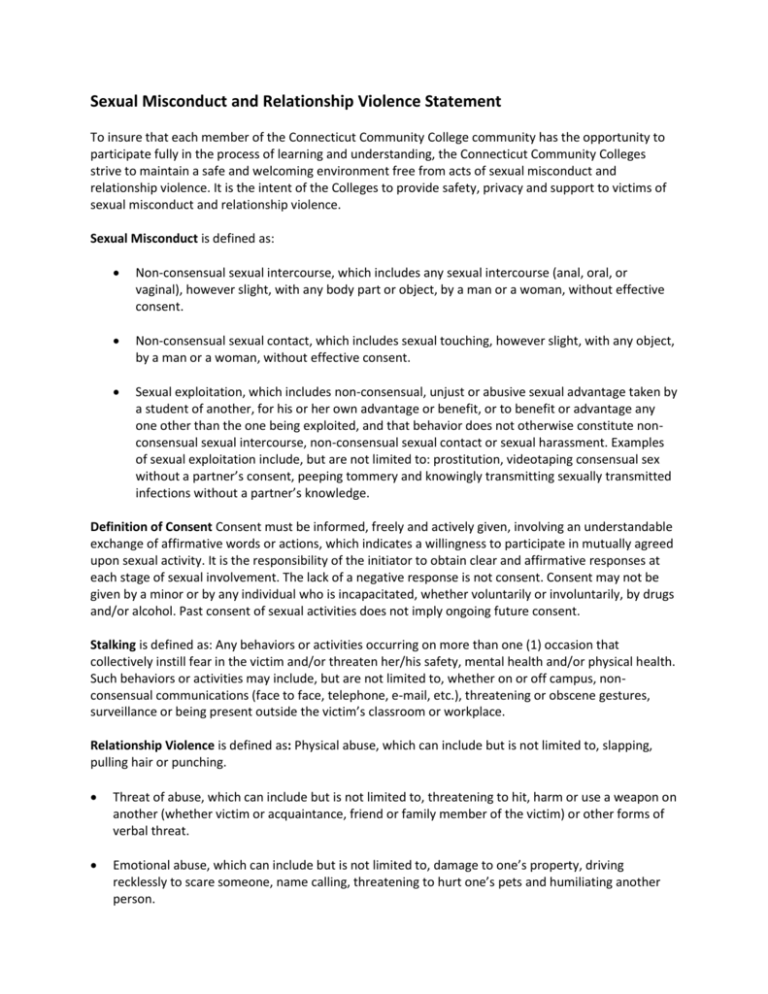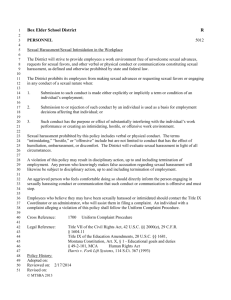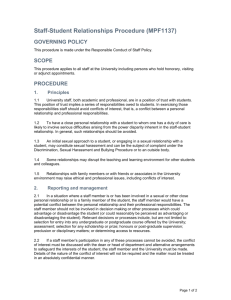
Sexual Misconduct and Relationship Violence Statement
To insure that each member of the Connecticut Community College community has the opportunity to
participate fully in the process of learning and understanding, the Connecticut Community Colleges
strive to maintain a safe and welcoming environment free from acts of sexual misconduct and
relationship violence. It is the intent of the Colleges to provide safety, privacy and support to victims of
sexual misconduct and relationship violence.
Sexual Misconduct is defined as:
Non-consensual sexual intercourse, which includes any sexual intercourse (anal, oral, or
vaginal), however slight, with any body part or object, by a man or a woman, without effective
consent.
Non-consensual sexual contact, which includes sexual touching, however slight, with any object,
by a man or a woman, without effective consent.
Sexual exploitation, which includes non-consensual, unjust or abusive sexual advantage taken by
a student of another, for his or her own advantage or benefit, or to benefit or advantage any
one other than the one being exploited, and that behavior does not otherwise constitute nonconsensual sexual intercourse, non-consensual sexual contact or sexual harassment. Examples
of sexual exploitation include, but are not limited to: prostitution, videotaping consensual sex
without a partner’s consent, peeping tommery and knowingly transmitting sexually transmitted
infections without a partner’s knowledge.
Definition of Consent Consent must be informed, freely and actively given, involving an understandable
exchange of affirmative words or actions, which indicates a willingness to participate in mutually agreed
upon sexual activity. It is the responsibility of the initiator to obtain clear and affirmative responses at
each stage of sexual involvement. The lack of a negative response is not consent. Consent may not be
given by a minor or by any individual who is incapacitated, whether voluntarily or involuntarily, by drugs
and/or alcohol. Past consent of sexual activities does not imply ongoing future consent.
Stalking is defined as: Any behaviors or activities occurring on more than one (1) occasion that
collectively instill fear in the victim and/or threaten her/his safety, mental health and/or physical health.
Such behaviors or activities may include, but are not limited to, whether on or off campus, nonconsensual communications (face to face, telephone, e-mail, etc.), threatening or obscene gestures,
surveillance or being present outside the victim’s classroom or workplace.
Relationship Violence is defined as: Physical abuse, which can include but is not limited to, slapping,
pulling hair or punching.
Threat of abuse, which can include but is not limited to, threatening to hit, harm or use a weapon on
another (whether victim or acquaintance, friend or family member of the victim) or other forms of
verbal threat.
Emotional abuse, which can include but is not limited to, damage to one’s property, driving
recklessly to scare someone, name calling, threatening to hurt one’s pets and humiliating another
person.
Sexual harassment, which can include any unwelcome sexual advance or request for sexual favors,
or any conduct of a sexual nature when submission to such conduct is made either explicitly or
implicitly a term or condition of an individual’s education; submission to or rejection of such conduct
by an individual is used as a basis for academic decisions affecting the individual; or such conduct
has the purpose or effect of substantially interfering with an individual’s academic performance or
creating an intimidating, hostile or offensive educational environment. Examples of conduct which
may constitute sexual harassment include but are not limited to:
o
o
o
o
o
o
o
o
o
sexual flirtation, touching, advances or propositions
verbal abuse of a sexual nature
pressure to engage in sexual activity
graphic or suggestive comments about an individual’s dress or appearance
use of sexually degrading words to describe an individual
display of sexually suggestive objects, pictures or photographs
sexual jokes
stereotypic comments based upon gender
threats, demands or suggestions that retention of one’s educational status is contingent
upon toleration of or acquiescence in sexual advances.
The definitions contained in this statement are in addition to any applicable provisions of state law.
Confidentiality While the College will treat reports of sexual misconduct and relationship violence
seriously and with sensitivity for all concerned, the College can not assure complete confidentiality in all
instances with respect to such information, particularly when that information pertains to an offense or
an alleged offender that may affect the safety of others on campus or is mandated to be reported.
What to Do If You Are the Victim of Sexual Harassment:
When a student feels that he or she has been the victim of sexual harassment, he or she should report
such incident(s) to a college official. Students may report incidents of sexual harassment to the Dean of
Students or to the Affirmative Action Officer. Nothing shall prevent students from speaking to a college
counselor about their concerns. However, such communication is not a substitute for filing a complaint
of sexual harassment with an appropriate college designee. Depending on the nature of the complaint
and the desires of the complainant, the college official to whom the complaint has been made may
attempt to resolve the complaint informally. Any informal resolution of a complaint must be approved
by the college President. No person shall be forced to pursue informal avenues of resolution before
filing a formal complaint of sexual harassment. If informal resolution is not possible or appropriate, a
written complaint should be filed in accordance with the existing Student Grievance Procedure for
students.
Time for Reporting
For students, a written complaint should be filed within 30days of the date the grievant knew or should
have known of the alleged harassment. However, where the alleged harasser is a faculty member and
the complainant is, at the time of the acts complained of, a student in that faculty member’s class, the
complaint should be filed no later than 15 days after the end of the semester. When a formal complaint
of sexual harassment is received, it will be investigated by the college. The rights of all persons involved
in the investigation shall be respected and every effort will be made to protect the confidentiality of
both the alleged victim and the alleged harasser. Toward this end, only persons with a need to know
shall be made privy to the complaint. However, complete anonymity cannot be assured, given the
college’s obligation under law to investigate and take appropriate action in all cases of sexual
harassment. All complaints of sexual harassment shall be taken seriously.
It is expected that complaints will be made in good faith, however. Frivolous or vexatious complaints
can cause irreparable damage to the reputation of an accused person, even though he or she is
subsequently vindicated. Therefore, any student who files a false complaint of sexual harassment shall
himself or herself be subject to disciplinary action, up to and including expulsion. A student who
believes he or she has been sexually harassed may, in addition to the available grievance procedure, file
a complaint with the Federal Office for Civil Rights, U.S. Department of Education (Region 1), John W.
McCormack, Post Office and Courthouse, Room 222, Post Office Square, Boston, Massachusetts 02109.
It is expected that complaints will be made in good faith, however. Frivolous or vexatious complaints
can cause irreparable damage to the reputation of an accused person, even though he or she is
subsequently vindicated. Therefore, any student who files a false complaint of sexual harassment shall
himself or herself be subject to disciplinary action, up to and including expulsion. A student who
believes he or she has been sexually harassed may, in addition to the available grievance procedure, file
a complaint with the Federal Office for Civil Rights, U.S. Department of Education (Region 1), John W.
McCormack, Post Office and Courthouse, Room 222, Post Office Square, Boston, Massachusetts 02109.
(Adopted October 18, 1976; amended February 19, 1979, April 20, 1981, July 20, 1981, November 16,
1987, and February 26, 1990; entirely replaced February 26, 2007, amended February 22, 2010)







